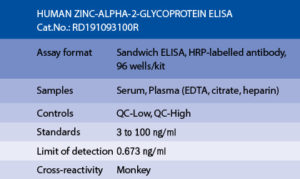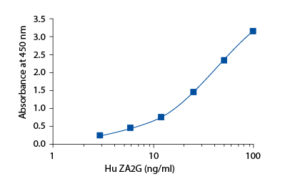Zinc-Alpha-2-Glycoprotein Human ELISA
Zinc-alpha-2-glycoprotein (ZAG, ZA2G, Azgp1, ZNGP1, Lipid-Mobilizing Factor, LMF) is a soluble 41 kDa glycoprotein belonging to the immunoglobuline protein family and consisting of a single polypeptide chain. Human ZAG shares 59% sequence identity with the murine homolog.
ZAG is closely related to antigens of the class1 major histocompatibility complex (MHC I) and shares 30-40 % sequence identity with the heavy chain of MHC I. Most MHC-I members heterodimerize with beta-2-microglobuline (b2m) and bind peptides derived from intracellular proteins to present them to cytotoxic T cells. In contrast, ZAG is a soluble protein rather than being anchored to plasma membranes that acts independently on b2m and binds the hydrophobic ligand which may relate to its function in lipid metabolism.
ZAG is widespread in body fluids and is also found in various human tissues such as adipose tissue, prostate, breast, skin, salivary gland, trachea, broncheus, lung, gastrointestinal tract, pancreas, liver and kidney. ZAG acts as a lipid mobilizing factor to induce lipolysis in adipocytes and plays an important role in lipid utilization and loss of adipose tissue, especially during cachexia, which occurs in patient suffering from cancer, AIDS and other chronic illnesses. The role of ZAG in cancer cachexia is also connected with its ability to directly influence expression of uncoupling proteins (UCPs) which are implicated in the regulation of energy balance. In human adipocytes, ZAG expression is regulated particularly through TNF-alpha and the PPAR gamma nuclear receptor. ZAG expression is also upregulated by glucocorticoides and attenuated by eicosapentaenoic acid (EPA) and beta-3-adrenoreceptor antagonists.
ZAG is overexpressed in certain human malignant tumors such as prostate, breast, lung or bladder cancer and can relate to tumor differentiation. Additionally, ZAG plays a role in obesity, diabetic kidney disorders, frontotemporal dementia and regulation of melanin production by melanocytes.
ZAG is proposed to have a therapeutic use in obesity and cachexia. It can be used as a marker for clinical analysis of diabetic nephropathy and as a marker for certain tumors..
The RD191093100R Human Zinc-Alpha-2-Glycoprotein ELISA is a sandwich enzyme immunoassay for the quantitative measurement of human zinc-alpha-2-glycoprotein in serum and plasma.
In the BioVendor Human Zinc-Alpha-2-Glycoprotein (ZA2G) ELISA, standards, quality controls and samples are incubated in microplate wells pre-coated with polyclonal anti-human ZA2G antibody. After 60 minutes incubation and washing, polyclonal anti-human ZA2G antibody, conjugated with horseradish peroxidase (HRP) is added to the wells and incubated for 60 minutes with captured ZA2G. Following another washing step, the remaining HRP conjugate is allowed to react with the substrate solution (TMB). The reaction is stopped by addition of acidic solution and absorbance of the resulting yellow product is measured. The absorbance is proportional to the concentration of ZA2G. A standard curve is constructed by plotting absorbance values against concentrations of standards, and concentrations of unknown samples are determined using this standard curve.
Intended use
Clinical Application
Test principle


Summary of protocol
– Aregger F, Pilop C, Uehlinger DE, Brunisholz R, Carrel TP, Frey FJ, Frey BM. Urinary proteomics before and after extracorporeal circulation in patients with and without acute kidney injury. J Thorac Cardiovasc Surg. 2010 Mar;139 (3):692-700
– Brettschneider J, Mogel H, Lehmensiek V, Ahlert T, Sussmuth S, Ludolph AC, Tumani H. Proteome Analysis of Cerebrospinal Fluid in Amyotrophic Lateral Sclerosis (ALS). Neurochem Res. 2008 May 15;
– Ceperuelo-Mallafre V, Escote X, Vilades C, Peraire J, Domingo P, Solano E, Sirvent JJ, Pastor R, Tinahones F, Leal M, Richart C, Vendrell J, Vidal F, Alba V, Aguilar A, Auguet T, Chacon MR, Lopez-Dupla M, Megia A, Miranda M, Olona M, Sauri A, Vargas M, Velasco I, Veloso S, Fontanet A, Gutierrez M, Mateo G, Munoz J, Sambeat MA. Zinc alpha-2 glycoprotein is implicated in dyslipidaemia in HIV-1-infected patients treated with antiretroviral drugs. HIV Med. 2012 May;13 (5):297-303
– Ceperuelo-Mallafre V, Naf S, Escote X, Caubet E, Gomez JM, Miranda M, Chacon MR, Gonzalez-Clemente JM, Gallart L, Gutierrez C, Vendrell J. Circulating and adipose tissue gene expression of zinc-alpha2-glycoprotein in obesity: its relationship with adipokine and lipolytic gene markers in subcutaneous and visceral fat. J Clin Endocrinol Metab. 2009 Dec;94 (12):5062-9
– Dichgans M, Petersen D. Angiographic complications in CADASIL. Lancet. 1997 Mar 15;349 (9054):776-7
– Ding Q, Mracek T, Gonzalez-Muniesa P, Kos K, Wilding J, Trayhurn P, Bing C. Identification of macrophage inhibitory cytokine-1 in adipose tissue and its secretion as an adipokine by human adipocytes. Endocrinology. 2009 Apr;150 (4):1688-96
– Fain JN, Tagele BM, Cheema P, Madan AK, Tichansky DS. Release of 12 Adipokines by Adipose Tissue, Nonfat Cells, and Fat Cells From Obese Women. Obesity (Silver Spring). 2009 Oct 15;
– Felix K, Fakelman F, Hartmann D, Giese NA, Gaida MM, Schnolzer M, Flad T, Buchler MW, Werner J. Identification of serum proteins involved in pancreatic cancer cachexia. Life Sci. 2011 Jan 31;88 (5-6):218-25
– Gao D, Trayhurn P, Bing C. Macrophage-secreted factors inhibit ZAG expression and secretion by human adipocytes. Mol Cell Endocrinol. 2010 Aug 30;325 (1-2):135-42
– Garrido-Sanchez L, Garcia-Fuentes E, Fernandez-Garcia D, Escote X, Alcaide J, Perez-Martinez P, Vendrell J, Tinahones FJ. Zinc-alpha 2-glycoprotein gene expression in adipose tissue is related with insulin resistance and lipolytic genes in morbidly obese patients. PLoS One. 2012;7 (3):e33264
– Gong FY, Zhang SJ, Deng JY, Zhu HJ, Pan H, Li NS, Shi YF. Zinc-alpha2-glycoprotein is involved in regulation of body weight through inhibition of lipogenic enzymes in adipose tissue. Int J Obes (Lond). 2009 Sep;33 (9):1023-30
– Jernas M, Olsson B, Sjoholm K, Sjogren A, Rudemo M, Nellgard B, Carlsson LM, Sjostrom CD. Changes in adipose tissue gene expression and plasma levels of adipokines and acute-phase proteins in patients with critical illness. Metabolism. 2009 Jan;58 (1):102-8
– Leal VO, Lobo JC, Stockler-Pinto MB, Farage NE, Abdalla DS, Junior ML, Mafra D. Is zinc-alpha2-glycoprotein a cardiovascular protective factor for patients undergoing hemodialysis?. Clin Chim Acta. 2012 Mar 22;413 (5-6):616-9
– Lee YP, Chang CH, Liu HH, Chen CY, Chen CY, Hsu CC, Chang CI, Lin YT, Lee CS, Tsai JS. Plasma zinc alpha2-glycoprotein levels correlate positively with frailty severity in female elders. Medicine (Baltimore). 2016 Aug;95 (35):e4753
– Mracek T, Ding Q, Tzanavari T, Kos K, Pinkney J, Wilding J, Trayhurn P, Bing C. The adipokine zinc-alpha2-glycoprotein (ZAG) is downregulated with fat mass expansion in obesity. Clin Endocrinol (Oxf). 2010 Mar;72 (3):334-41
– Mracek T, Stephens NA, Gao D, Bao Y, Ross JA, Ryden M, Arner P, Trayhurn P, Fearon KC, Bing C. Enhanced ZAG production by subcutaneous adipose tissue is linked to weight loss in gastrointestinal cancer patients. Br J Cancer. 2011 Feb 1;104 (3):441-7
– Olofsson LE, Olsson B, Lystig T, Jacobson P, Jernas M, Sjoholm K, Gummesson A, Sjostrom L, Eriksson P, Hamsten A, Hale LP, Thelle DS, Carlsson B, Carlsson LM. Preliminary report: Zn-alpha2-glycoprotein genotype and serum levels are associated with serum lipids. Metabolism. 2010 Sep;59 (9):1316-8
– Philipp A, Kralisch S, Bachmann A, Lossner U, Kratzsch J, Bluher M, Stumvoll M, Fasshauer M. Serum levels of the adipokine zinc-alpha2-glycoprotein are increased in chronic hemodialysis. Metabolism. 2011 May;60 (5):669-72
– Riaz S, Skinner V, Srai SK. Effect of high dose thiamine on the levels of urinary protein biomarkers in diabetes mellitus type 2. J Pharm Biomed Anal. 2011 Mar 25;54 (4):817-25
– Roher AE, Maarouf CL, Sue LI, Hu Y, Wilson J, Beach TG. Proteomics-derived cerebrospinal fluid markers of autopsy-confirmed Alzheimer’s disease. Biomarkers. 2009 Nov;14 (7):493-501
– Selva DM, Lecube A, Hernandez C, Baena JA, Fort JM, Simo R. Lower zinc-alpha2-glycoprotein production by adipose tissue and liver in obese patients unrelated to insulin resistance. J Clin Endocrinol Metab. 2009 Nov;94 (11):4499-507
– Simo R, Hernandez C, Saez-Lopez C, Soldevila B, Puig-Domingo M, Selva DM. Thyroid hormone upregulates zinc-alpha2-glycoprotein production in the liver but not in adipose tissue. PLoS One. 2014;9 (1):e85753
– Somparn P, Hirankarn N, Leelahavanichkul A, Khovidhunkit W, Thongboonkerd V, Avihingsanon Y. Urinary proteomics revealed prostaglandin H(2)D-isomerase, not Zn-alpha2-glycoprotein, as a biomarker for active lupus nephritis. J Proteomics. 2012 Jun 18;75 (11):3240-7
– Sorensen-Zender I, Beneke J, Schmidt BM, Menne J, Haller H, Schmitt R. Zinc-alpha2-glycoprotein in patients with acute and chronic kidney disease. BMC Nephrol. 2013;14:145
– Stejskal D, Karpisek M, Reutova H, Stejskal P, Kotolova H, Kollar P. Determination of serum zinc-alpha-2-glycoprotein in patients with metabolic syndrome by a new ELISA. Clin Biochem . Nov 29 (2007)
– Tedeschi S, Pilotti E, Parenti E, Vicini V, Coghi P, Montanari A, Regolisti G, Fiaccadori E, Cabassi A. Serum adipokine zinc alpha2-glycoprotein and lipolysis in cachectic and noncachectic heart failure patients: relationship with neurohormonal and inflammatory biomarkers. Metabolism. 2011 Jun 20;
– Vanni H, Kazeros A, Wang R, Harvey BG, Ferris B, De BP, Carolan BJ, Hubner RH, O’Connor TP, Crystal RG. Cigarette smoking induces overexpression of a fat-depleting gene AZGP1 in the human. Chest. 2009 May;135 (5):1197-208
– Wargent ET, O’Dowd JF, Zaibi MS, Gao D, Bing C, Trayhurn P, Cawthorne MA, Arch JR, Stocker CJ. Contrasts between the effects of zinc-alpha2-glycoprotein, a putative beta3/2-adrenoceptor agonist and the beta3/2-adrenoceptor agonist BRL35135 in C57Bl/6 (ob/ob) mice. J Endocrinol. 2013 Feb;216 (2):157-68
– Yeung DC, Lam KS, Wang Y, Tso AW, Xu A. Serum zinc-alpha2-glycoprotein correlates with adiposity, triglycerides, and the key components of the metabolic syndrome in chinese subjects. J Clin Endocrinol Metab. 2009 Jul;94 (7):2531-6
– Zhu HJ, Wang XQ, Pan H, Gong FY, Zhang DX, Li NS, Wang LJ, Yang HB. Serum Levels of the Adipokine Zinc- alpha 2-glycoprotein Are Decreased in Patients with Hypertension. ISRN Endocrinol. 2014;2014:374090
– Escoté X, Aranda GB, Mora M, Casals G, Enseñat J, Vidal O, Esteban Y, Halperin I, Hanzu FA. Zinc alpha-2 glycoprotein is overproduced in Cushing’s syndrome. Endocrinol Diabetes Nutr. 2017 Jan;64(1):26-33. doi: 10.1016/j.endinu.2016.10.002

